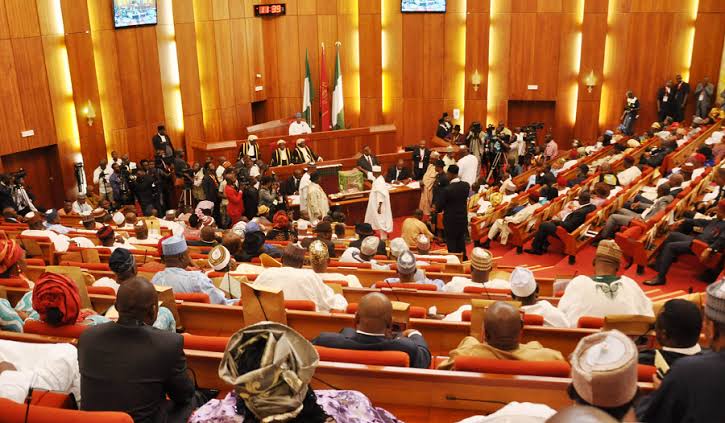SERAP asks court to slash jumbo allowances for Buhari, govs, NASS members
Socio-Economic Rights and Accountability Project (SERAP) has asked the Federal High Court in Abuja “to order the Revenue Mobilization Allocation and Fiscal Commission (RMAFC) and the National Salaries, Incomes and Wages Commission (NSIWC) to perform their statutory functions to review downward the remuneration and allowances of President Muhammadu Buhari, Vice-President Yemi Osinbajo, 36 governors and members of the National Assembly.”
SERAP is arguing that “slashing jumbo pay for these high-ranking political office-holders would reduce the unfair pay disparity between political officer holders and judicial officers, address the persistent poor treatment of judges, and improve access of victims of corruption to justice and effective remedies.”
In the suit number FHC/ABJ/CS/658/2021 filed last Friday, SERAP is seeking: “an order of mandamus to direct and compel the RMAFC to send its downward review of the remuneration and allowances of these high-ranking public office holders and recommendations to the National Assembly for appropriate remedial and legislative action, as provided for by the Nigerian Constitution 1999 [as amended].”
SERAP is also seeking “an order of mandamus to direct and compel the RMAFC to perform its mandatory constitutional duty to urgently review upward the remuneration, salaries and allowances, as well as the conditions of service for Nigerian judges.”
Joined in the suit as Respondents are Senate President, Ahmad Lawan; Speaker of House of Representatives, Femi Gbajabiamila, for themselves, and on behalf of all members of the Senate and House of Representative; and the National Judicial Council.
SERAP is arguing that: “While high-ranking political office-holders continue to enjoy lavish allowances, including life pensions, and access to security votes, which they have powers to spend as they wish, the remuneration and allowances of judges are grossly insufficient to enable them to maintain themselves and their families in reasonable comfort.”
According to SERAP: “The huge pay disparity between these high-ranking political officer-holders and judges is unfair, unjust and discriminatory, especially given the roles of judges to the people and the country.”
SERAP is also seeking “an order of mandamus to direct and compel NSIWC to perform its mandatory legal duty to urgently examine, streamline and recommend upward remuneration and allowances of Nigerian judges, and to recommend downward review of allowances of President Buhari, Vice-President Osinbajo, 36 governors and lawmakers to the National Assembly.”
The suit filed on behalf of SERAP by its lawyers Kolawole Oluwadare and Ms Adelanke Aremo, read in part: “the remuneration and allowances of judges have fallen substantially behind the average salaries and allowances of high-ranking political office-holders such as President, Vice-President, governors and lawmakers.”
“While government reviewed upward the salaries and allowances of political office holders on four occasions between May 1999 and March 2011, the salaries and allowances of judicial officers were only reviewed twice during the same period.”
“The review of the remuneration, allowances, and conditions of service for political, public and judicial office holders carried out by the RMAFC in 2009 shows huge disparity between the remuneration and allowances of judges and those of high-ranking political office-holders.”
“The NSIWC in a letter to SERAP admitted that it has powers to examine, streamline and recommend the salary scales applicable to each post in the public service but informed us to redirect our request to the RMAFC.”
“There is a legal duty upon the RMAFC to urgently review downward the remuneration and allowances of high-ranking political office-holders.”
The rather unfair treatment of members of the judiciary – being one of the three coordinate branches of the government – is akin to contempt. It can be reasonably inferred that the judiciary are considered so unimportant by the political class, hence the refusal to pay them reasonable remuneration and allowances.”
“Judges should get all to which they are reasonably entitled, and it is unfair, illegal, unconstitutional, and discriminatory to continue to treat judges as second-class people while high-ranking political office-holders continue to enjoy lavish salaries and allowances.”
“Despite their important roles and responsibilities, Nigerian judges are poorly treated, particularly when their remuneration, salaries, allowances, and conditions of service are compared with that of political office-holders. Judges should not have to endure the most poignant financial worries.”
“The increase in the cost of living and the injustice of inadequate salaries bears heavily on judges, as it undermines their ability to effectively perform their judicial functions.”
“The roles and functions performed by judges across the country are second to none in their importance, including in facilitating access of victims of corruption and human rights violations to justice and effective remedies.”
“As a safeguard of judicial independence, the budget of the judiciary ought to be prepared in collaboration with the judiciary having regard to the peculiar needs and requirements of judicial administration.”
“The remuneration and pensions of judges must be secured by law at an adequate level that is consistent with their status and is sufficient to safeguard against conflict of interest and corruption.”
“Nigerians would continue to bear the brunt of denied access to justice, a better judiciary and a better administration of justice until judges across the country are paid what they rightly deserve.”
No date has been fixed for the hearing of the suit.

